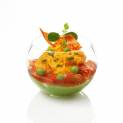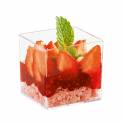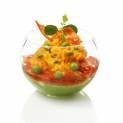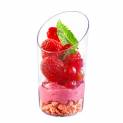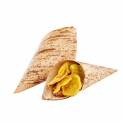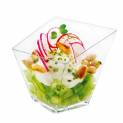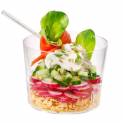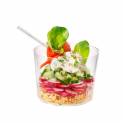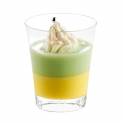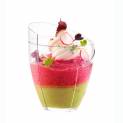
Are Bamboo Disposable Plates Safe for Food?
As more people look for ways to be more eco-friendly, bamboo products, especially bamboo disposable plates, have become very popular. These plates are often used for parties, picnics, and events because they’re advertised as a greener, biodegradable alternative to plastic plates. But many people still wonder: Are bamboo disposable plates safe for food? We are exploring whether bamboo disposable plates are safe, how they’re made, and how they benefit the environment.
What Are Bamboo Disposable Plates?
Bamboo disposable plates are plates made from bamboo fibers that are processed and molded into a plate shape. They are designed for single use, making them a convenient option for events where reusable plates might not be practical, like outdoor parties or catered events.
Bamboo is a fast-growing plant and is considered a highly renewable resource, making it an environmentally friendly choice. Bamboo plates are often made by combining bamboo pulp with other natural materials like sugarcane or cornstarch. These plates are usually labeled as biodegradable or compostable, meaning they break down naturally over time and are much better for the environment compared to plastic plates.
Are Bamboo Disposable Plates Safe for Food?
When it comes to food safety, bamboo disposable plates are generally safe. However, there are a few factors to consider.
1. Natural Material
Bamboo is a natural, non-toxic material. It doesn’t contain harmful chemicals like BPA or phthalates, which are often found in plastic plates. This makes bamboo plates a safer choice for serving food, especially when compared to plastic or Styrofoam plates that can leak harmful chemicals when heated.
2. How They Are Made
The safety of bamboo plates can depend on how they’re made. Some plates are made from bamboo pulp, which is simply bamboo fibers processed into plate form. Others, especially molded bamboo plates, may contain added resins or binders to help hold the plate together and keep its shape. While these materials are often safe, it’s important to check whether the plates are food-safe and free from harmful additives. High-quality bamboo plates usually don’t contain harmful chemicals, but it’s a good idea to look for plates that are certified as food-safe.
3. Heat Resistance
Bamboo plates can handle hot foods, but they have their limits. If exposed to high heat for long periods, the plates may warp or lose their shape. For example, serving food that is too hot, like pizza just out of the oven, could cause the plate to weaken. Check the manufacturer’s recommendations to see how much heat the plates can handle.
4. Microwave and Oven Use
Most bamboo plates are not microwave or oven safe. The materials used to make some bamboo plates might not be safe for high temperatures, and exposing them to intense heat can cause the plate to crack or weaken. Always check the manufacturer’s instructions to make sure the plates can handle heat sources like microwaves or ovens.
Are Bamboo Disposable Plates Biodegradable?
Bamboo plates are biodegradable, which means they break down naturally in the environment. Bamboo grows quickly and doesn’t need pesticides, making it an eco-friendly choice. Unlike plastic plates, which can take hundreds of years to decompose, bamboo plates break down much faster.
However, bamboo plates need to be disposed of correctly to fully break down. If they end up in a landfill without proper conditions, it might take longer for them to degrade. To help the environment, it’s best to compost bamboo plates in a proper composting environment, where they can decompose within a few months.
How to Choose the Best Bamboo Disposable Plates
When choosing bamboo disposable plates, keep these factors in mind to make sure you’re getting a safe and eco-friendly product:
-
Look for Certifications: Choose bamboo plates that are certified as food-safe. This means they have been tested and confirmed to be safe for food use.
-
Check the Composition: Some bamboo plates may contain added chemicals, such as resins or coatings, to make them stronger. Choose plates that use natural, non-toxic materials without added synthetic chemicals.
-
Consider Biodegradability: Make sure the plates are truly biodegradable. Some bamboo plates may have additional coatings that can slow down their ability to break down.
-
Temperature Guidelines: Always check the manufacturer’s recommendations to know how much heat the plates can handle. This will help you avoid using them with foods that are too hot.
Conclusion
Bamboo disposable plates are generally safe for food, as long as they are made from high-quality, food-safe materials. They provide a better alternative to plastic and Styrofoam plates, offering both safety and environmental benefits. However, it’s important to choose bamboo plates from trusted brands and follow the manufacturer’s guidelines for use to ensure that they are both safe and eco-friendly.
By using bamboo disposable plates, you’re helping reduce your environmental impact while also enjoying the convenience of single-use dinnerware. If you dispose of them responsibly, bamboo plates can be a safe, sustainable choice for your next event or gathering. Sweet Flavor embraces these eco-friendly alternatives, offering you a sustainable and stylish solution for your dining needs. By choosing their bamboo disposable plates, you not only support the environment but also enhance the overall dining experience at your events or gatherings.

